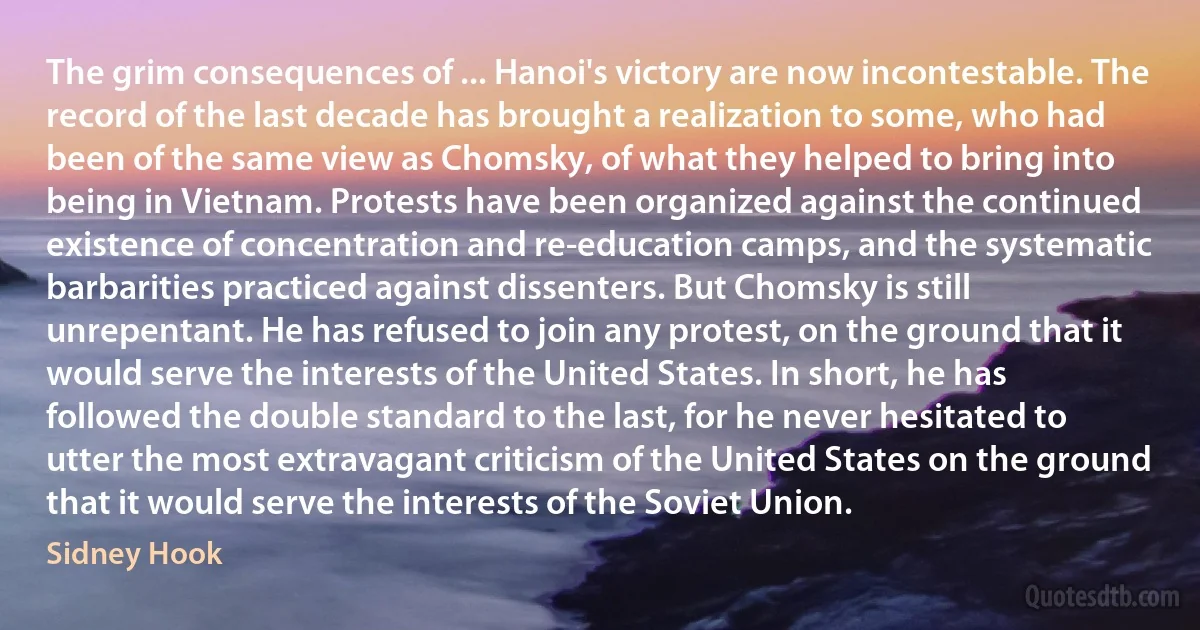Concentration Quotes - page 9
Men have been released from [concentration] camps who have taken over the jargon of their jailers and with cold reason and mad consent (the price, as it were, of their survival) tell their story as if it could not have been otherwise than it was, contending that they have not been treated so badly after all.

Max Horkheimer
The new order contradicts reason so fundamentally that reason does not dare to doubt it. Even the consciousness of oppression fades. The more incommensurate become the concentration of power and the helplessness of the individual, the more difficult for him to penetrate the human origin of his misery.

Max Horkheimer
I had nothing to do with concentration camps - Himmler's work. There was a labor minister, Ley, whose position is like your John Lewis in America. My duties were to assign POW and foreign labor to factories or whatever work had to be done. I had nothing to do with punishment, criminals, and so forth. That's Himmler's work. If someone had told me as a seaman I should have engaged in politics I would have taken it as an insult. After my return from France, when I found the workers in the Schweinfurt factory all divided up into groups, many parties - I want to give you an honest reason - that's why I became a National Socialist. In 1922-23 I knew, by fate, I must find a solution to the labor and social problem.

Fritz Sauckel
The Prosecution holds me responsible for the concentration camps, for the destruction of Jewish life, for Einsatzgruppen and other things. All of this is neither in accord with the evidence nor with the truth. The accusers as well as the accused are exposed to the dangers of a summary proceeding. It is correct that I had to take over the Reich Security Main Office. There was no guilt in that in itself. Such offices exist in governments of other nations too. However, the task and activity assigned to me in 1943 consisted almost exclusively in the reorganization of the German political and military intelligence service, though not as Heydrich's successor. Almost a year after his death I had to accept this post under orders and as an officer at a time when suspicion fell on Admiral Canaris of having collaborated with the enemy for years. In a short time I ascertained the treason of Canaris and his accomplices to the most frightful extent.

Ernst Kaltenbrunner
How could we bear, nursed as we have been in a free atmosphere, to be gagged and muzzled; to have spies, eavesdroppers and delators at every corner; to have even private conversations caught up and used against us by the Secret Police and all their agents and creatures; to be arrested and interned without trial; or to be tried by political or Party courts for crimes hitherto unknown to civil law. How could we bear to be treated like schoolboys when we are grown-up men; to be turned out on parade by tens of thousands to march and cheer for this slogan or for that; to see philosophers, teachers and authors bullied and toiled to death in concentration camps; to be forced every hour to conceal the natural workings of the human intellect and the pulsations of the human heart? Why, I say that rather than submit to such oppression, there is no length we would not go to.

Winston Churchill
The moment one constructs a device to carry into practice a crude idea, he finds himself unavoidably engrossed with the details of the apparatus. As he goes on improving and reconstructing, his force of concentration diminishes and he loses sight of the great underlying principle.... I do not rush into actual work. When I get an idea, I start at once building it up in my imagination. I change the construction, make improvements and operate the device in my mind. It is absolutely immaterial to me whether I run my turbine in thought or test it in my shop. I even note if it is out of balance.

Nikola Tesla
I live in the Managerial Age, in a world of "Admin." The greatest evil is not now done in those sordid "dens of crime" that Dickens loved to paint. It is not done even in concentration camps and labour camps. In those we see its final result. But it is conceived and ordered (moved, seconded, carried, and minuted) in clean, carpeted, warmed, and well-lighted offices, by quiet men with white collars and cut fingernails and smooth-shaven cheeks who do not need to raise their voice. Hence, naturally enough, my symbol for Hell is something like the bureaucracy of a police state or the offices of a thoroughly nasty business concern.

C. S. Lewis
The weight and concentration of the poems fall upon things (and those great things, animals and people), in their tough, laconic, un-get-pastable plainness: they have kept the stolid and dangerous inertia of the objects of the sagas-the sword that snaps, the man looking at his lopped-off leg and saying, "That was a good stroke.”.

Randall Jarrell
The overall importance of capital today, as noted, is not very different from what it was in the eighteenth century. Only its form has changed: capital was once mainly land but is now industrial, financial, and real estate. We also know that the concentration of wealth remains high, although it is noticeably less extreme than it was a century ago. The poorest half of the population still owns nothing, but there is now a patrimonial middle class that owns between a middle and a third of total wealth, and the wealthiest ten percent now own only-two thirds of what there is to own rather than nine-tenths.

Thomas Piketty
Stevens's poetry makes one understand how valuable it can be for a poet to write a great deal. Not too much of that great deal, ever, is good poetry; but out of quantity can come practice, naturalness, accustomed mastery, adaptations and elaborations and reversals of old ways, new ways, even-so that the poet can put into the poems, at the end of a lifetime, what the end of a lifetime brings him. Stevens has learned to write at will, for pleasure; his methods of writing, his ways of imagining, have made this possible for him as it is impossible for many living poets-Eliot, for instance. Anything can be looked at, felt about, meditated upon, so Stevens can write about anything; he does not demand of his poems the greatest concentration, intensity, dramatic immediacy, the shattering and inexplicable rightness the poet calls inspiration.

Randall Jarrell
The distribution of wealth is one of today's most widely discussed and controversial issues. But what do we really know about its evolution over the long term? Do the dynamics of private capital accumulation inevitably lead to the concentration of wealth in ever fewer hands, as Karl Marx believed in the nineteenth century? Or do the balancing forces of growth, competition, and technological progress lead in later stages of development to reduced inequality and greater harmony among the classes, as Simon Kuznets thought in the twentieth century? What do we really know about how wealth and income have evolved since the eighteenth century, and what lessons can we derive from that knowledge for the century now under way?

Thomas Piketty
![Against the new leviathan, whether in the guise of universal suffrage, democracy, or of an equally fraudulent triumphant proletariat, [Kierkegaard] pitted the individual human soul made in the image of a God who was concerned about the fate of every living creature. In contrast with the notion of salvation through power, he held out the hope of salvation through suffering. The Cross against the ballot box or the clenched fist; the solitary pilgrim against the slogan-shouting mob; the crucified Christ against the demagogue-dictators promising a kingdom of heaven on earth, whether achieved through endlessly expanding wealth and material well-being, or through the ever greater concentration of power and its ever more ruthless exercise. (Malcolm Muggeridge)](https://cdn.quotesdtb.com/img/quotes_images_webp/12/malcolm-muggeridge-ballot-box-303612.webp)


